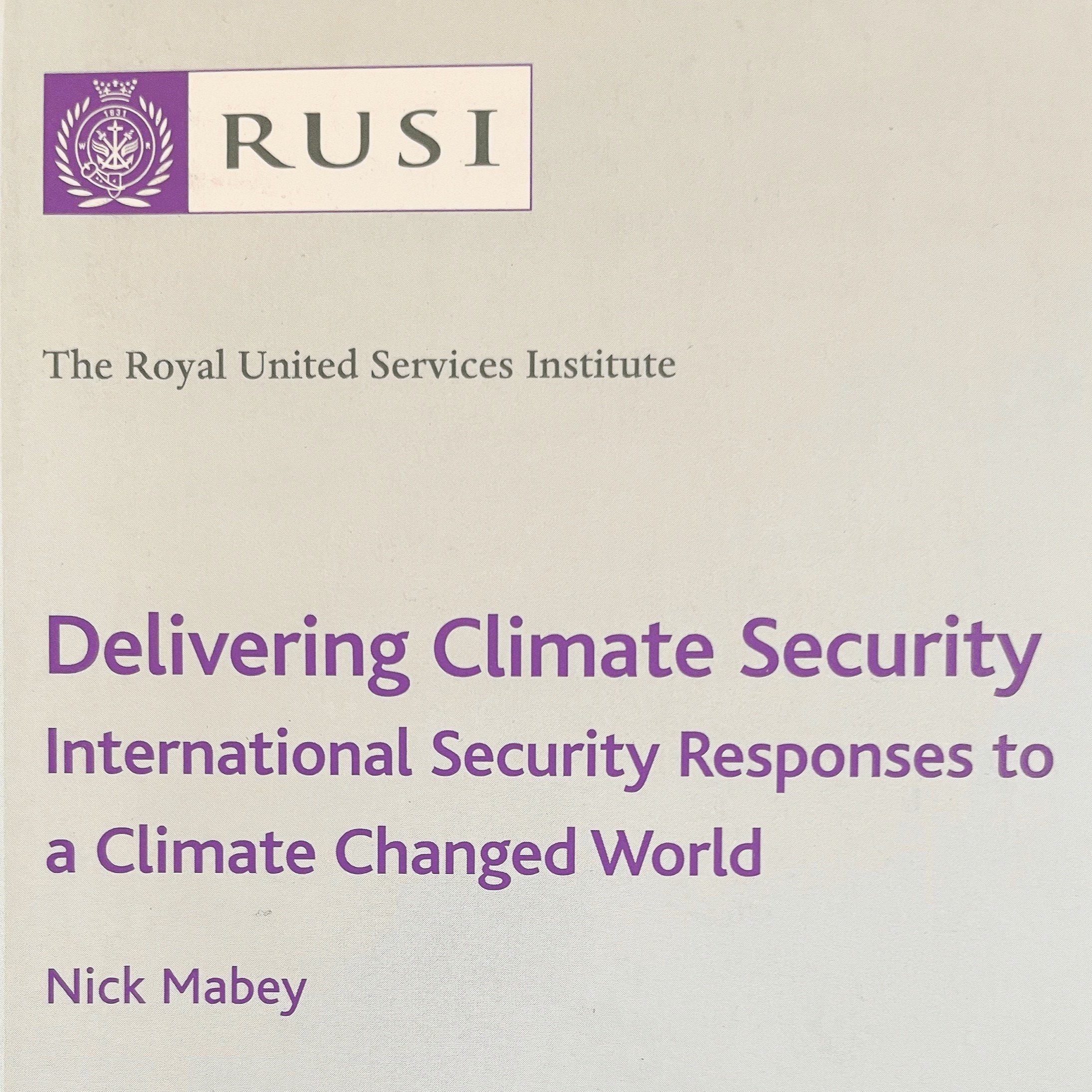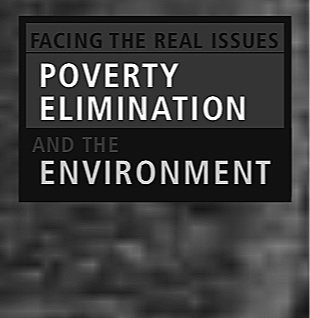Books and Major Reports
Selected long form writing
-

Argument in the Greenhouse
Nick Mabey was the lead author of Argument in the Greenhouse (1995) a book based on groundbreaking work by a team led by Stephan Hall at London Business School’s Centre for Economic Forecasting which integrated climate change dynamics into a mainstream global macro-econometric model.
Nick Mabey used this innovative model to explore critical aspects of climate policy, including: the role of technical change in driving down emission reduction costs; social, employment and trade impacts of climate policy; and, the game theoretic dynamics of achieving stable international climate agreements.
The results outlined in Argument in the Greenhouse - which are still relevant - were highly critical of simple carbon pricing policies and advocated using a range of analytical and policy tools to ensure effective, efficient and politically sustainable climate action. This work underpinned much of Nick Mabey’s later climate advocacy at WWF-UK and beyond.
-

Europe in the World
In 2005-6, Nick Mabey and his E3G co-founder Tom Burke travelled across and beyond Europe asking politicians, thought leaders and journalists to share their vision for the EU in 2020.
These conversations, and a wealth of background research into public opinion and the economic condition of Europe, was synthesised into the pamphlet Europe in the World.
EITW laid out some key political choices facing the Europe if it was to prosper in a world of growing economic interdependence, geopolitical tensions and climate change.
EITW was published in 10 languages, discussed at the highest levels of European governments and set the direction of E3G’s European work for the next decade.
-

Degrees of Risk
Developed in 2010 in partnership with active and past security planners in the US and Europe Degrees of Risk aimed to answer the question: If the security threat from climate change was analysed as rigourously as nuclear proliferation, what would an appropriate risk management strategy to deliver climate security look like?
Degrees of Risk was influential in shaping debates and policy in Washington DC despite the polarisation of climate change issues. The launch presentation at CSIS in Washington can be seen here.
The analysis formed the foundation of E3G's forward work on climate security, resilience and the reform of central government climate decision support systems.
-

Delivering Climate Security
Food riots in Mexico City, environmental outrage from Osama bin Laden and Russian territorial claims in the Arctic: 2007 saw climate change emerge as a serious issue across the security agenda, from the abstraction of discussions in the UN Security Council to the brutal reality of drought-driven conflict in Africa. These were the first signs of how climate change and our responses to it will fundamentally change the strategic security context in the coming decades.
In an increasingly uncertain world these trends are disturbingly predictable. Climate change is already creating hard security threats, but it has no hard security solutions.
Delivering Climate Security was published in 2008 and made front page headlines in setting out a stark assessment of current failures in climate policy and practice, their potential security consequences and the need for the security community to speak more loudly in support of rapid climate action.
-

Investing in Prevention
Nick Mabey was co-team leader for the Prime Minister’s Strategy Unit project on Countries at Risk of Instability (2004-5).
The resulting public report Investing in Prevention was the result of both desk analysis and “live” piloting of new policy approaches across Whitehall. It outlined a comprehensive strategy, key institutional reforms and new tools for improving responses to instability and conflict. A short overview of systemic reforms proposals can be found here.
Focusing on the need for effective early investment in national stability shaped by deep risk analysis and holistic understanding of country politcal dynamics. It was also one of the first major reports to integrate climate change into “mainstream” security planning.
Investing in Prevention received significant media attention and drove a range of UK government reforms over the next decade, including the Countries at Risk of Instability Index still produced for the UK National Security Council, as well as shaping international debates on reform for conflict prevention.
-

Net Benefits
Nick Mabey was team leader on the Prime Minister’s Strategy Unit 2004 review of the UK Marine Fisheries Industry; a 12 month process involving intensive engagement with politically charged stakeholders around the UK and across Europe.
The resulting report Net Benefits made the case that the UK fishing industry - despite recent declines - had a healthy, profitable and sustainable future if major regulatory and industry reforms were undertaken inside an overall framework of environmental sustainability. It also promoted the importance of explicitly recognising the interests of recreational fisheries and marine biodiversity inside fisheries management.
By advocating that reforms were needed on all sides Net Benefits managed to build a core consensus and many of its proposed reforms were implemented. It also received over 75,000 downloads in its first month despite there only being 12,000 active fishers in the UK industry at that time!
-

Low Carbon Political Economy and Entanglement
The transformational nature of the transition to a low-carbon economy is now being recognised by policy makers in countries at the leading edge of climate mitigation. Over recent years policy action and economic drivers have combined to present structural challenges to existing market structures, regulatory systems and incumbent interest groups.
These structural impacts cannot be effectively managed through marginal policy instruments such as carbon taxes or energy regulation alone but require more cross-cutting sectoral reforms.
Commissioned by the OECD to feed into the G7 Summit in 2017, Nick Mabey led the E3G team producing Low Carbon Political Economy and Entanglement brings together years of E3G political analysis and experience of understanding how to build political support for rapid low carbon transitions.
-

Understanding Climate Diplomacy
Climate diplomacy is the practice and process of creating the international climate change regime and ensuring its effective operation. The evolution of climate diplomacy precedes and shapes the construction of the climate regime.
Climate diplomacy must draw on the best practice of modern diplomacy and innovate new approaches.
Climate diplomacy is evolving in scope and complexity as the climate regime shifts its focus to implementation and climate risk management. This has prompted better integration of climate change into foreign policy, a growth of alliances between both state and non-state actors, and new approaches to shaping global conversations on climate change.
Nick Mabey led the E3G team writing Understanding Climate Diplomacy which was commissioned by CDKN in 2013 as a guide for developing country diplomats to understand emerging best practice in climate & foreign policy.
-

United We Stand
Out of the ashes of World War II, the United Nations (UN) was founded to maintain global peace, rights and security. Today, the world is a dramatically different place. Since 1945 the UN has helped institutionalise human rights, assisted millions of refugees fleeing persecution and built agreement to address global challenges like climate change.
These successes are grounds for hope, not complacency. Since 1945, the risks to international peace and security have also transformed and climate risk is threatening the United Nation’s core mission.
United We Stand was written by Nick Mabey and Camilla Born in 2016 to outline a reform agenda for the new UN Secretary General to make he UN fit for purpose in a climate changed world. It resulted in several reform processes including creation of the UN Climate Security Mechanism.
-

Britain and Security: Security trends and threat misperceptions
In 2007 British security policy and capability was increasingly focusing on a post 9/11 agenda of anti-terrorism and proliferation of weapons of mass destruction.
Nick Mabey’s contribution to the Smith Institute volume “Britain and Security” argued that this risks ignoring the most damaging and likely threats to UK security in the coming decade.
Highlighting the significant & immediate threats from organised crime, pandemics, financial instability, climate change and energy security - especially in destabilising North Africa . The chapter argues for a more balanced British security policy that focuses on prevention and resilience alongside reactive capaibilties.
-

FDI and the Environment
The 1990’s saw a rapid proliferation in FDI and related trade flows, but also unprecedented environmental destruction . Public disputes over the environmental impact of globalisation raged with little evidence on either side.
This WWF-UK FDI Report written by Nick Mabey and Richard McNally aimed to move away from usual discussions of “pollution havens” to analyse the broader impact of foreign investment on natural resource use, pollution and biodiversity.
Based on years of WWF’s global work, it concluded that that positive outcomes from FDI would only occur inside an international regulatory framework that promotes sustainable development and preserves environmental limits. It argued that negotiations on investment liberalisation at the WTO and OECD should not proceed without this broader framework.
The collapse of the 1999 WTO talks in Seattle stimulated political interest in “responsible globalisation” in order to rebuild public support for globalisation but this - and the anti-globalisation movement - was washed away by the geopolitics of 9/11.
-

Poverty Elimination and the Environment
Published in 1998 to shape the UK’s new development ministry DFID, Poverty Elimination and the Environment: Facing the Real Issues was written by Nick Mabey based on an on-going global assessment of WWF’s poverty and conversation work.
It argued that too often environmental protection is portrayed as a brake on economic development, or a concern of the rich middle classes. But it is the world’s poor who directly depend on the natural environment, and who are most at risk from climate change, pollution and uncontrolled resource use.
Destroying the world’s remaining natural ecosystems will not raise the poor into prosperity. Neither will keeping people in poverty preserve the natural world.
Responsibility lies with the over-consumption of rich countries, and the failure of developing countries to address environmental issues which impact upon their poorest citizens. Responsibility for finding solutions lies with everybody, but requires dialogue that avoids the politics of blame and faces up to the real issues.